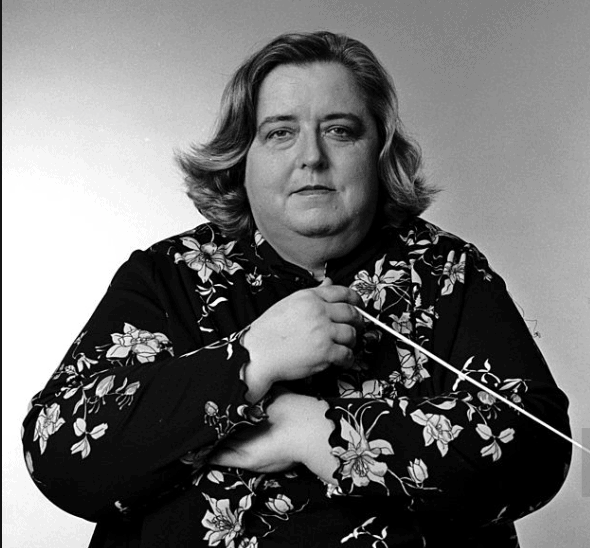“If you can sell green toothpaste in this country, you can sell opera.” [Sarah Caldwell]
Sarah Caldwell was the First Woman to conduct the orchestra at the Metropolitan Opera in New York. A producer, director, and impresario, as well as an opera conductor, she was known for her dramatic opera productions and support of obscure works.
The daughter of a mother who was a music teacher and choral director, Caldwell began giving violin concerts when she was still in grade school. A prodigious talent, she completed high school when she was 14 and attended Hendrix College in Arkansas. She later attended both the University of Arkansas and the New England Conservatory of Music. She won a scholarship as a viola player at the Berkshire Music Center in 1946 and, in 1947, staged Vaughan William’s Riders to the Sea. She had several opportunities presented to her but chose the New England Opera Company, where she was mentored by Boris Goldovsky and served as his chief assistant for 11 years.
In 1957, Caldwell founded the Opera Company of Boston, which she then led for 34 years. She worked with many of the most famous artists of the era: Joan Sutherland, Marilyn Horne, Renata Tebaldi and Jon Vickers. When she hired the tenor Placido Domingo, for $250 a performance, he was still relatively unknown.
Strapped for cash, Caldwell’s productions required ingenuity, perhaps part of what led to her reputation for originality and daring. She supervised everything, from casting to lighting, stage direction, musical direction, fundraising and research. “Opera is everything rolled into one,” she said, “music, theater, the dance, color and voices and theatrical illusions.”
Caldwell was always on the search for an undiscovered or forgotten opera, and did not blanche at works that were complex or difficult to produce. She produced innovative adaptions of operas like Giuseppe Verdi’s Don Carlosand Modest Mussorgsky’s Boris Gudonov. She also presented American premieres of works by Schoenberg, Hindemith, and Luigi Nono.
As the opera company struggled for funds, Caldwell staged operas in unlikely places. When “The Daughter of the Regiment” was produced in a gymnasium, soprano Beverly Sills made her entrance in a carriage drawn by a horse. During this time, Caldwell and Sills became friends. Sills said of Caldwell, “She was the Orson Welles of the operatic world. She could do anything.” When Sarah Caldwell became the First Woman to conduct at the Met in 1972, almost a century after it was founded, Beverly Sills was on stage performing in “La Traviata.”
During this time, Caldwell continued to manage the Opera Company of Boston. In 1980, when Beverly Sills became the First Woman general manager of the New York City Opera, Caldwell and Sills were two of only three women opera directors in the United States: Sills in New York, Caldwell in Boston, and Carol Fox at the Lyric Opera in Chicago.
By the 1989/1990 season, Caldwell’s opera company was insolvent, over $5 million in debt and forced to close its doors. Caldwell was given a distinguished professor of music position at the University of Arkansas where she headed their opera program until ill health ended her stellar career.
Caldwell was the first recipient of the Kennedy Center Award for excellence. She also received the Rogers and Hammerstein Award and the 1996 National Medal for Arts was presented to her by President and Mrs. Clinton. She had already been recognized on the cover of Time magazine in 1975, when she was proclaimed “Music’s Wonder Woman.”
“Once in a while,” she told Time magazine, “when everything is just right, there is a moment of magic. People can live on moments of magic.” Caldwell herself was magic, and indefatigable in pursuit of her dreams.

